February, 2017
Growing up is an arduous adventure, but the journey is clouded by even more uncertainties after diagnosis of SEN – new faces yet to be acquainted with, new titles that sound confusing more than clarifying…how is a special education preschool teacher different from a regular teacher? Why does the speech therapist keep playing toys with my child? What does a child need occupational therapist for? When should we consult an educational psychologist...?
They are indeed guardian angels who support SEN children and their families through the obstacle race ahead. To facilitate mutual trust and understanding, professionals from four sectors are interviewed to give a better idea on how they help children with SEN.
Speech therapists focus on the speech communication abilities of children, including expression, comprehension, pronunciation, oral muscles, and socialising. From birth to six years old is the critical period for speech development and it is necessary to start assessment and training in time. "Many parents wrongly assume that nothing can be done when young children do not know how to speak yet. In fact, pre-linguistic skills can reveal certain traces and even young children who do not know how to speak yet can start learning," says Winnie Cheng Ka Man, Speech Therapist of St. James' Settlement Uncle James Child Development Centre.
Pre-linguistic skills refer to prerequisites for learning language, examples are –
Imitation: Can the child observe and imitate the sound made by his/her mother?
Turn-taking: Does the child stop and listen when the other person speaks?
Communication motive: Under normal circumstances, communication motive is intrinsic. Most babies cry to notify adults for caretaking but not autistic children – they rarely initiate communication.
Symbolic gaming skills: Does the child know how to imagine games? Infants aged below one may not have the idea of playing with toys, therapists observe if they can infer the function of an object, such as baby bottle for drinking milk or comb for detangling hair.
Winnie Cheng explains that some parents may find their child different from others, most of which related to pre-linguistic skills, at a very early age. For example, when the child spots a biscuit, does he express his desire vocally with gurgles and coos? Or would he rather grab it with his hand? Children's behaviours can point to different symptoms – children with autism make significantly less eye contact even before two years old; children with Down syndrome, albeit slower in speech development, have sufficient communication motives.
For children who are slower in development, speech therapists need to identify possible reasons and help them catch up with children of the same age accordingly. It is indeed a process of unravelling. In addition to standard assessments, speech therapists observe children's behaviours, including their curiosity for the environment and interactions with parents, during therapy sessions and enquire parents about their children's behaviours in other communities.
"If a child comes with a teat in his mouth, we will observe if the muscles around his mouth are saggy or lips are drooling. We also want to know about their eating habits – do they prefer congee to rice? Do they eat food that is cut into very small pieces? All these reduce the chance for children to practise their oral muscles and consequently compromise their enunciation.
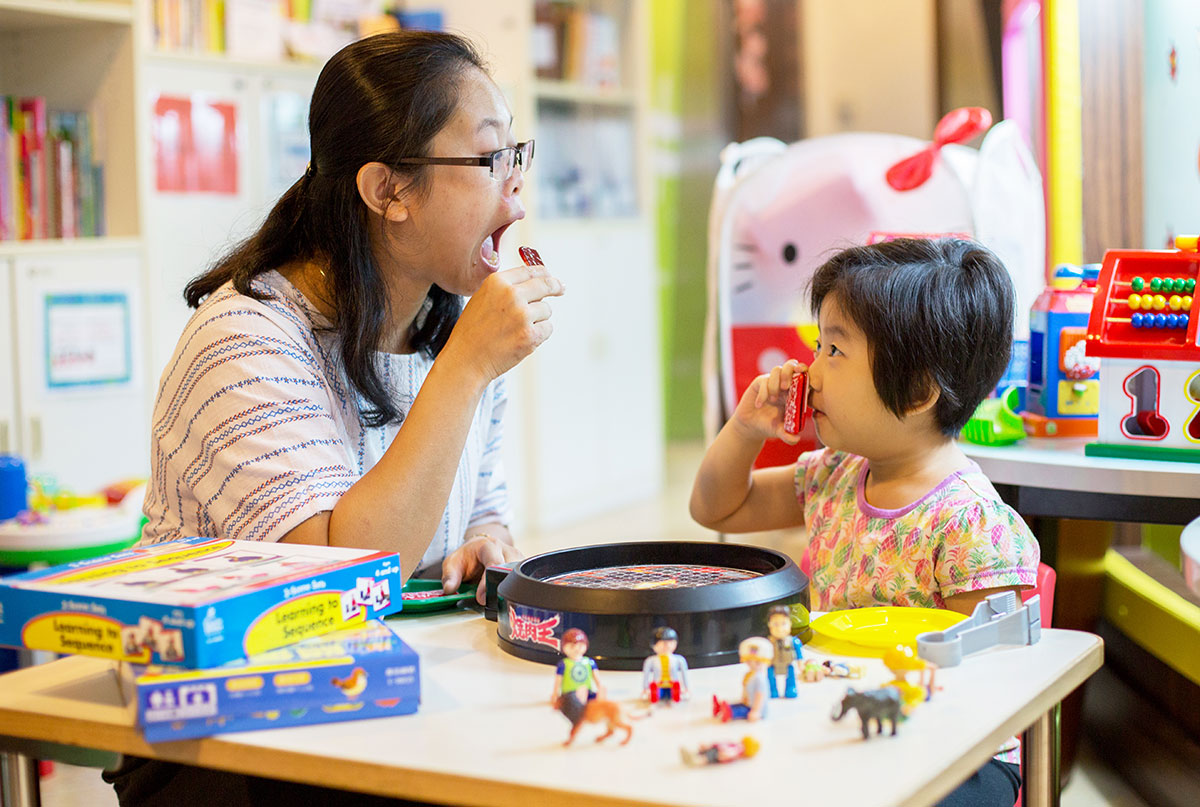 Winnie Cheng hopes children understand that besides making requests, speech is also for sharing feelings and expressing opinions.
Winnie Cheng hopes children understand that besides making requests, speech is also for sharing feelings and expressing opinions.
Winnie Cheng owns a treasure trove of toys, flash cards, teethers of all sizes, etc. She brings out a toy kitchen set in class to play with a girl and encourages her to repeat a sentence pattern, such as "put a sausage on a plate" and "put a bun on a plate." Every speech therapy session has a specific goal like learning a certain syllable or a sentence structure. Apart from one-on-one training, group session that gathers few children with similar levels of development and personality is useful for rehearsing future peer interactions.
"I hope they can understand that speech is so much more than for making enquires or requests, it is also for sharing feelings and expressing opinions," says Winnie Cheng.
Winnie Cheng encourages parents to sit in on class, because they are also part of the training. "We remind parents, at the start of the session, to prepare themselves for participating. No matter how many classes or how good the child performs in the presence of the therapist, he/she needs to practise at home to reinforce what is learnt in class, let alone applying it to daily life."
Some training sessions need the participation of parents more than others – how to use verbal cues to prompt children to speak a sentence? Where is the best location for placing a teether? These are rather hard to communicate via phone calls.
"Most children show better progress when they are kept company by their parents. After acquiring the techniques in class, parents can practise with their children at home and apply liberally to everyday life. They are welcome to share with speech therapists the difficulties encountered during home training. We can make suggestions accordingly or choose other games to enhance motivation for learning."
However, Winnie Cheng and many other speech therapists observe that there are fewer and fewer parents, but more and more foreign domestic helpers, coming to class in recent years. "If the helper has an accent, I will not recommend her to join because it will possibly obstruct the training."
Hong Kong parents are constantly under immense pressure nowadays – asking for time off work is almost impossible, caregiving after work is exhausting, and now what? Participating in training? "I know it is rather brutal for parents."
Now a mother of two young children, Winnie Cheng gets a better hang of the importance of "effortless home training." Practices that can be incorporated in daily life are the best – parents can take turns to repeat the same sentence pattern at meals "put some pork on your plate" "put some fish on your plate"; or when dad holds the child high up in the air, he should ask "how many times do you want to fly?" and prompt the child to answer in complete sentences. For parents who can hardly take a day off, Winnie Cheng recommends them to sit in on class at least once a month.
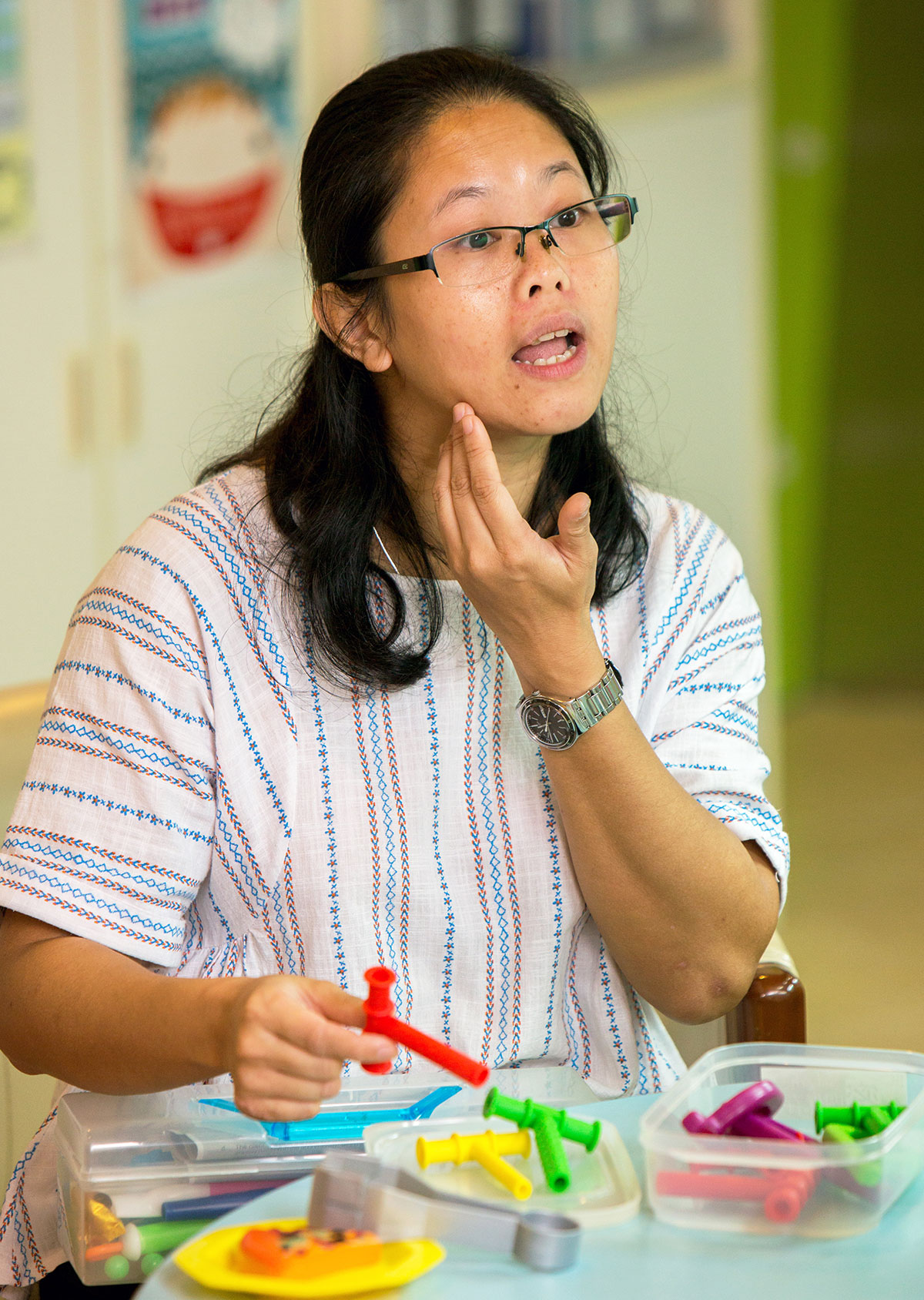 Teethers are placed differently according to circumstances, and it is hard to communicate via phone calls. Winnie Cheng recommends busy parents to sit in on class at least once a month.
Teethers are placed differently according to circumstances, and it is hard to communicate via phone calls. Winnie Cheng recommends busy parents to sit in on class at least once a month.
Winnie Cheng has had a lot of striking cases in years of being a speech therapist. A five-year-old boy she met had a ready tongue but poor pronunciation at first. He got fifteen out of nineteen Cantonese initials wrong, but managed to learn all of them after ten lessons. "His physical conditions were normal and he was quick at absorbing new knowledge. His mother was very hard-working too. We practised the 'si si' sound while playing. The boy did not mind being corrected when he was having fun and that led to his remarkable progress."
There are also some upsetting examples. During the assessment of a two-year-old, therapists quickly identified typical symptoms of autism in his eye contact and ways of interaction. His parents, however, seemed rather reluctant to accept the assessment results and did not stay for training. A year later, they returned. Unfortunately, because he had not been followed up over a substantial period of time, not much progress was made and he missed some critical phases.
Winnie Cheng notes, "Some parents assume that children eventually learn to speak when they go to school or boys begin to speak later. While these ideas may not be entirely irrelevant, the gap is worth noting – if a child with developmental delay lags behind his peers for more than half a year, meaning others are capable of speaking sentences and he can only utter single words, then we need to pay attention."
"Some regard special education preschool teacher as a profession of conscience and compassion because preschool children do not know how to complain about the teaching or personal preferences of the teacher to their parents. In other words, compassion must come before techniques and knowledge." Joyce Tam Shuk Ming, Senior Teacher of Heep Hong Society, says, "This job is a bumpy ride filled with obstacles and setbacks – only compassion can hold everything together."
Joyce Tam, once a special education preschool teacher, is now a trainer of teachers. The profession of special education preschool teacher is widely recognised nowadays, but it was not so well defined back in the 1980s, even Joyce Tam found herself grappling with ambiguity when she first started.
"Back in those days, we were called 'preschool caregivers' instead of 'teachers'. I needed to spoon-feed children, get them to the potty, and put them to sleep every day, which were nothing close to teaching. A therapist team was yet to be formed and I had to explore and experiment everything by myself. I was sworn at by an 8-year-old boy because I failed to lift him from his wheelchair to the toilet."
Joyce Tam had been thinking of quitting during the first six months until she met a trainer with astonishing passion and standards . "My mind was boggled with inspirations." Joyce Tam quotes her teacher's conviction, "Teaching is a profession and we need to respect our own profession."
A profession is built upon knowledge and methodology, a basis on which special education preschool teachers identify the most suitable practices for every child in need.
"Half of the children in our centre are diagnosed with autism. Their personality is a two-sided coin in which you see rigidity from one side and self-discipline from the other. As long as a right trail of class rules is ready for them, they are more than willing to follow and adhere to it. This practice is not only time-saving, but also allows children to have a better understanding of our orders."
In one case, how could teachers solicit children to pack away toys after class? Teachers at the centre had exhausted all sorts of sensory cues such as chiming, drumming, raising banners but only very few children cared to pay attention. The TEACCH structured teaching approach was their last straw and children were invited to read the timetable when time was right. Fortunately, it worked like magic and 80% of the children gradually learnt to queue up.
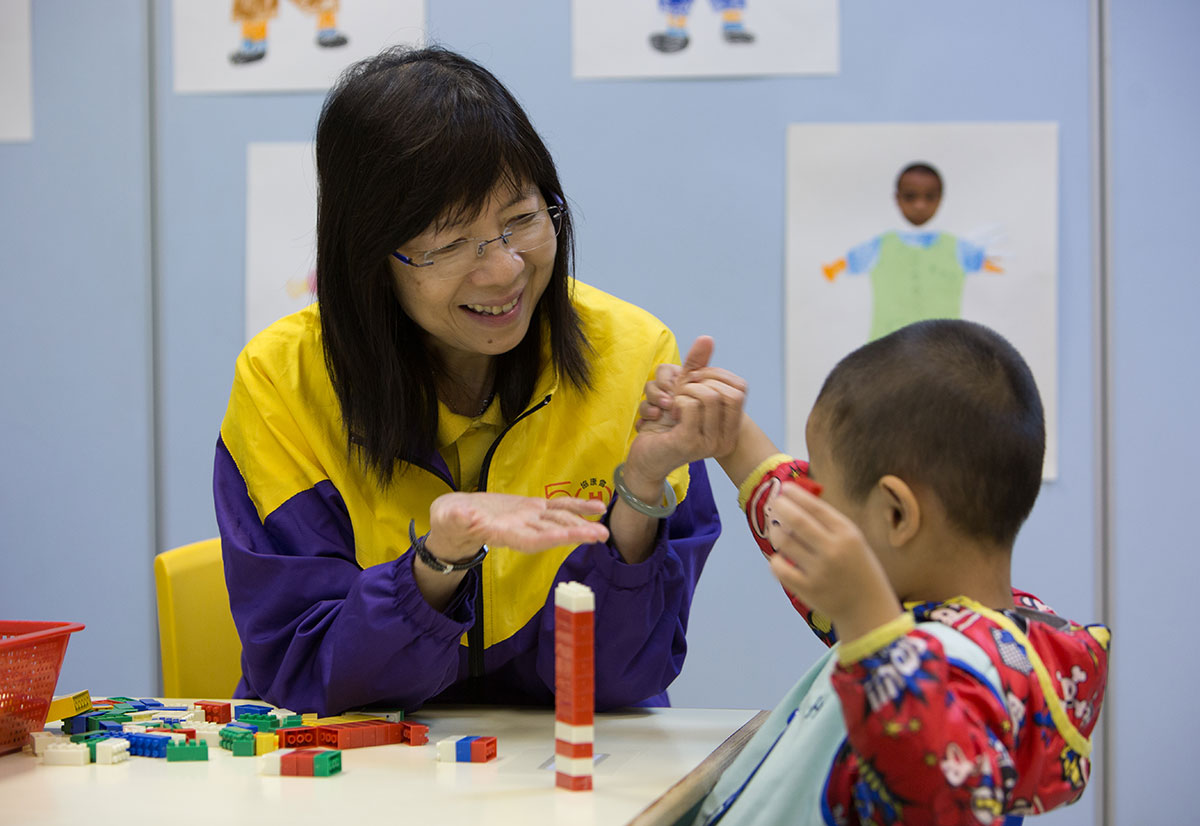 A special education preschool teacher needs to understand a child with diligence. For instance, the personality of autistic children is a two-sided coin with rigidity from one side and self-discipline from the other.
A special education preschool teacher needs to understand a child with diligence. For instance, the personality of autistic children is a two-sided coin with rigidity from one side and self-discipline from the other.
Joyce Tam nonetheless admits that a teacher, however experienced, tends to overlook at times.
"Male and female toilets in our centre are merely divided by a panel. A new boy who was reluctant to use the gents' once pushed other girls away to rush into the ladies'. When I got into his way, he screamed and shoved me down." The boy was fine and Joyce Tam left with a bump on her head. Yet, she felt repentant not for her injury but for her lack of thorough consideration. "I should not have fought with a child." After close observations, teachers found out the sequence of events – every time when the boy was about to set his foot in the gents', he would stop, look up, take a step back and dash into the ladies'. It was suspected that he was scared by the spinning ceiling fan at the gents'.
"Many autistic children are particularly sensitive to senses, be it hearing, touching, temperature or smell. Since they are not good at articulating themselves, adults have to tease out and try to comprehend the reasons behind. Adults should not take action heedlessly, unless in case of danger." Joyce Tam continues, "We switched off the fan before the boy needed to use the bathroom and taught him with flashcards. He gradually came to understand and all was well."
Some children have serious trouble with going out. One of the jobs of special education preschool teachers is, therefore, to guide these children into social settings. "A five-year-old flipped out and made a scene whenever he was out on the street. His parents could never have a chance for normal family time." His parents explained that, over the years, they would measure his feet at home before getting new shoes on his behalf. A new training target was thus set by his teachers – the boy must be brought to a shoe shop for choosing the shoes himself.
"I was very thrilled to see everything pay off in the end," smiles Joyce Tam. "Such training takes a long time and many enduring efforts. It may not be the most cost-effective method but the experience of working closely with parents and helping a child overcome a hurdle is gold."
Trust is the cornerstone of partnership; however, Joyce Tam identifies trust-building as the most difficult part for special education preschool teachers and it seems to have become harder these days.
Parents' anxiety has been mounting in recent years, as Joyce Tam observes. Sometimes, parents call and check in just because their children show an increased appetite at home.
"Parents worry about all sorts of things – from the care to their child, to fairness in classroom management and the amount of homework. Some may even come with an attitude. I often have to assist my colleagues to deal with negative emotions as swiftly as possible, so as to regain composure for the next day. These parents constantly dwell in frustration, which is not meant to be directed against the teacher." Some over-reliant parents may ask the teacher about every single thing, however trivial, in life. "They have their heart in their mouth all the time."
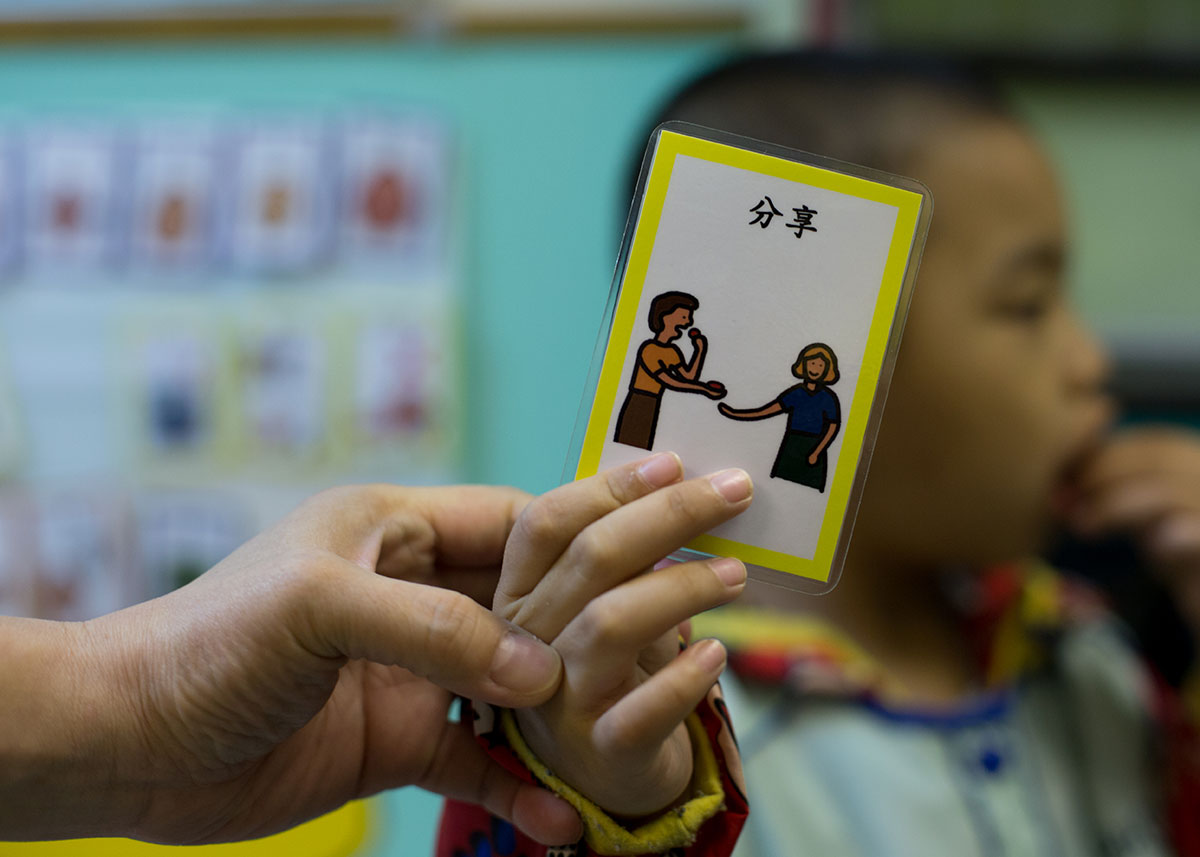 Flashcards in classroom are good help for children to express.
Flashcards in classroom are good help for children to express.
The air of dreariness at the annual briefing session for parents of new students always gives Joyce Tam mixed feelings. "None of the parents look hopeful. Our centre is not an elite school that promises a primrose path. Some are here because they are left with no choice; some are still struggling to accept their own child; some, whose child is first admitted at the age of five, are worn by setbacks at other kindergartens. Such negativity is so hard to contain that parents may vent it on our frontline staff unintentionally." Joyce Tam has to help her colleagues remain empathetic towards parents and their distress.
"That is why trust should not be taken for granted. Trust is an outcome of persistent efforts." Fortunately, the hard work of teachers is often recognised by gratitude messages and tearful farewells at graduation. "Otherwise, we would not have managed to hang on," jokes Joyce Tam.
Joyce Tam wants to assure parents that, apart from very rare exceptions, special education preschool teachers are all professionals. Communication is crucial for mutual trust. Parents are more than welcome to disclose their doubts to teachers without the need to worry that their honesty will affect teachers' impression of the child. Besides keeping themselves up-to-date, teachers should also be ready to lend a listening ear to parents and put themselves to their shoes – all because this obstacle race ahead is never easy.
"Parents must have gone through a lot of struggles when their child is assessed and then allocated to a Special Child Care Centre, but I still recommend them to admit their child to a centre as early as possible. The centre houses a full team of professionals to ensure support for every child. Preschool age is an important phase of learning and children can enjoy special training at the centre and learn to develop their own potential without being delayed," asserts Joyce Tam.
"During the early days of our training, our instructor has already alerted us that the love for children did not make a good enough reason to be an educational psychologist. A teacher spends a lot of time with children every day, whereas an educational psychologist comes in contact with chaperones of the children. We need to enjoy working with teachers and parents because it is our job to help them understand their children and improve the systems that surround the children." Alice Keung Yuen Ching, Educational Psychologist of Heep Hong Society, explains, "Psychology believes that every child is unique and each has his/her own needs and gems. Our mission is to help them actualise themselves and ultimately integrate into society."
Alice Keung's vision of educational psychology requires a certain foresight. In a Special Child Care Centre, an educational psychologists focus on devising courses and adjusting training directions according to the children's needs and empirical practices. They also need to keep abreast of the latest treatment methods, work with other frontline staff to adapt practices to local cultures, and offer more training to local teachers in return.
For this reason, SEN children and their parents rarely meet an educational psychologist in person during regular training, unless in case of complicated circumstances. "In situations like little progress in learning, emotional anxiety, and unfortunate events at home, social workers may invite us to meet the client together. We may also want to meet children to keep track of their progress before reaching a milestone, such as starting a mainstream primary school."
Educational psychologist also plays a significant role in the practice of integrated education. Alice Keung once represented her institution to serve as a psychologist based in a primary school, which required her to attend weekly meetings with school teachers to discuss the learning difficulties encountered by SEN children. "While teachers are well-informed of the symptoms of autism spectrum disorders (ASD) and dyslexia, they may not fully understand the needs and difficulties of individual cases. Some children have to overcome more than a singular symptom. We need to examine case by case and solicit teachers to join us in assessing the effectiveness of the current support strategies. One step further goes the extra mile."
Educational psychologists are often involved in the case meeting organised by school for in-depth discussions on the learning progress of every SEN child. Alice Keung notices that teachers tend to stress the priority of students with attention deficit hyperactivity disorder (AD/HD) for doctor's assessment and medications. While medications can enhance the brain to function up to par, they only manage to handle part of the problems. Teacher should not overlook the importance of special classroom arrangements, for example, to invite (but not punish) AD/HD students to sit in the front row or to break learning process down for students to complete in small steps.
Alice Keung understands that teachers may feel their hands tied by the already overwhelming curriculum, but some arrangements are beneficial to SEN children as much as other students. For instance, teacher can give more elaborate instructions during lessons and arrange simple exercises after recess for exuberant students to calm down and get back to class. Teachers can also prepare small gifts so that they can commend any well-behaved students by leaving a treat on their desks during class time. The goal is to take every chance to reinforce good behaviours in time, instead of punishing mischief. If a SEN child cannot sit still, kindly invite him/her to demonstrate the proper sitting posture to the rest of the class as a friendly reminder.
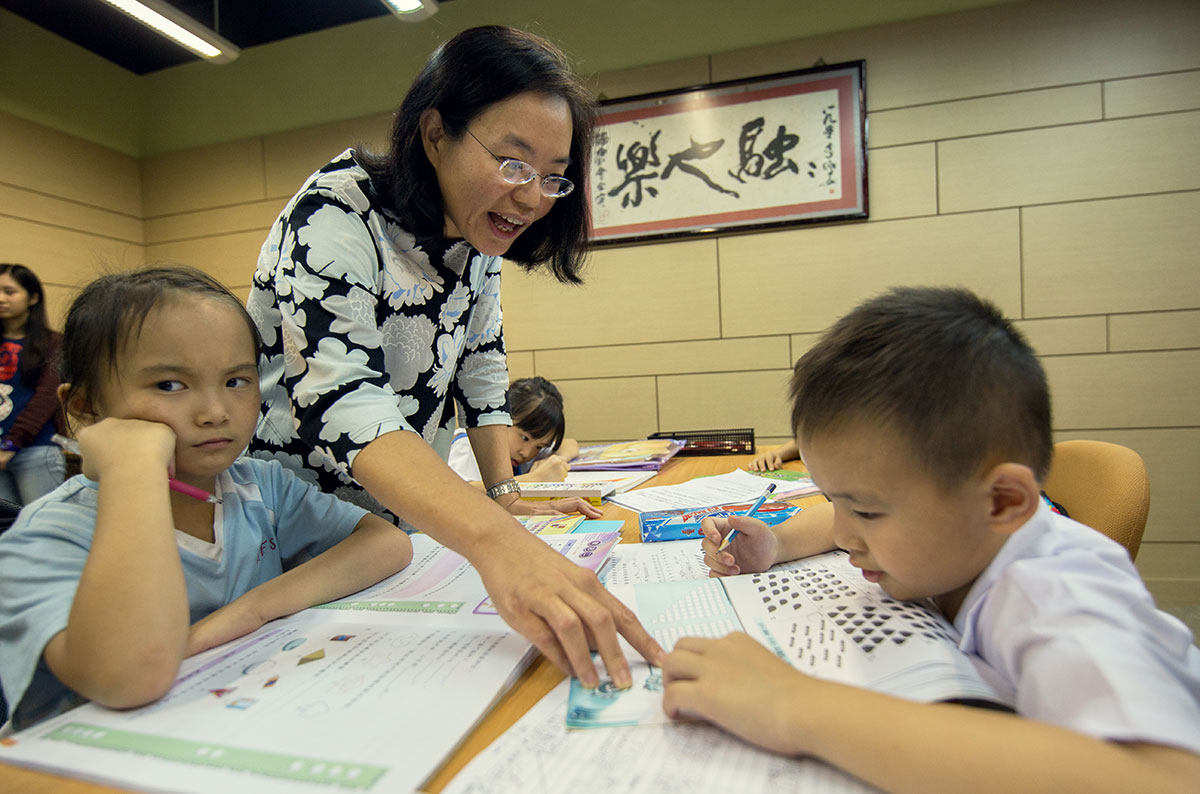 Teachers can use small tricks to spice up classroom dynamics. Instead of punishing mischief, they should take every chance to reinforce good behaviours in time.
Teachers can use small tricks to spice up classroom dynamics. Instead of punishing mischief, they should take every chance to reinforce good behaviours in time.
"It is important not to identify the faults of SEN children and make them accountable for all mischievous deeds lest exposing them to further peer rejection and endless complaints. We need to improve the classroom dynamics."
Of all cases, a student with multiple developmental delays (a combination of ASD, AD/HD, and anxiety disorder) has left the strongest impression on her mind. He was obsessed with flipping switches. When he got told off, he did not stop but repeated more vigorously with a playful smile. This type of children is usually ranked the least favourite of teachers.
"The child's parents sought help from us because he had been receiving training from our centre since preschool age. We then arranged a meeting with the school and explained to them that the inconsistency between his facial expressions and emotions came from his anxiety. The more criticism he got the more anxious he became, the more likely he repeated his impulsive behaviours."
That meeting was proved to be fruitful – teachers started to view the boy in a different light and the school-based psychologist subsequently took over and taught him to better express his emotions and refrain himself from impulsive behaviours. Alice Keung emphasises that this kind of consultation must be handled carefully to avoid misunderstandings.
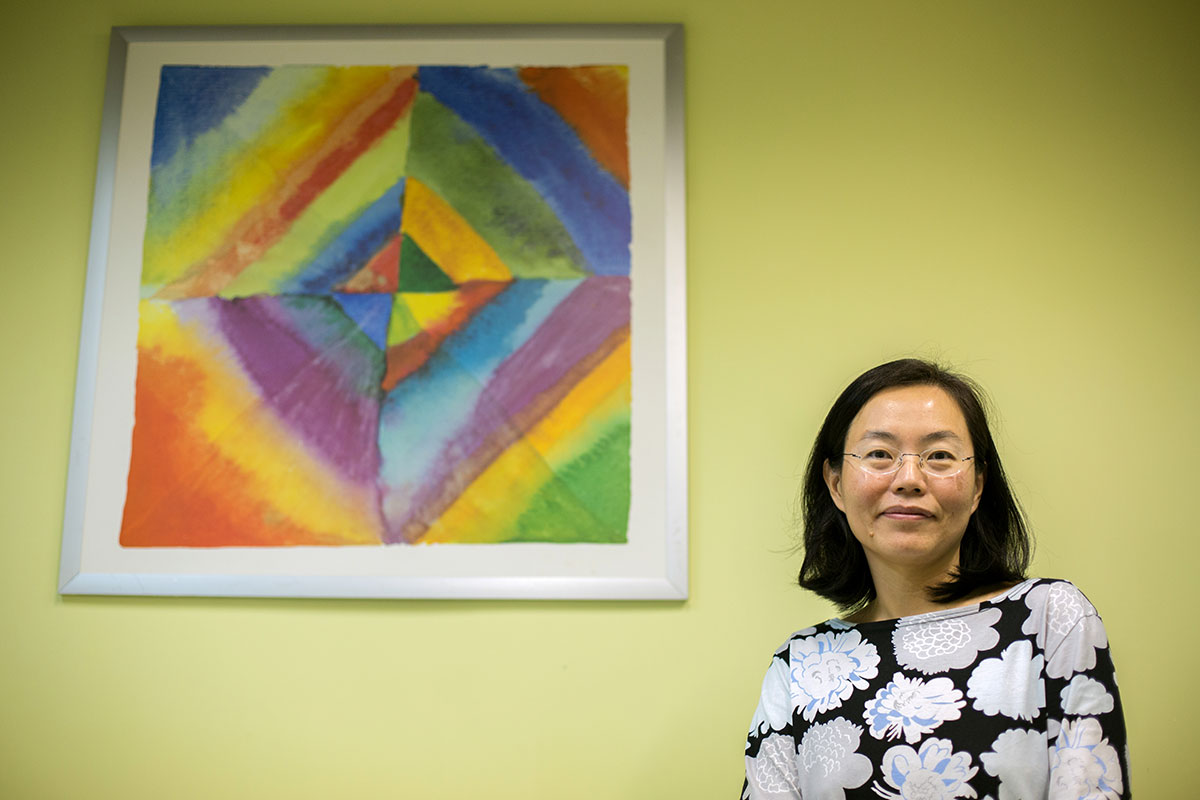 Alice Keung has a kind reminder for parents: they should know their child better than experts do.
Alice Keung has a kind reminder for parents: they should know their child better than experts do.
"Parents sometimes think that a word from psychologist is all it takes to convince a teacher and teachers sometimes think that parents send a psychologist in just to put in a good word for the child. Neither is true – no matter who comes for us, the profession of educational psychology requires us to put the child's well-being as our top priority, explain our suggestions with empirical evidences, and facilitate communication. Teachers need to understand the child and parents should also understand the concerns and restraints of teachers.
Alice Keung hopes parents understand that experts cannot decide for parents and that each option has its own pros and cons. Experts would help parents to make sense of the child's conditions, analyse circumstances, and provide informed options. "But after all, parents should know their child better than we do."
Once set his foot in the game room, a child gets excited right away and races to the huge colourful drum. Rambunctious laughter rings through the walls and leaves me wonder – what if all students can learn with such fun…
Joanne Chow Sau Lai, Occupational Therapist of Caritas Learning and Growth Support Project, rates, "The laughter you just heard is only a three on a scale of five." She adds, "This room is not always filled with guffaws and you can even hear shrieks of fear occasionally. Some children are not thrilled but scared by these facilities. They may refuse to enter the room and drag their parents back to the exit."
Extreme reactions from children pertain to the often talked about "Sensory Integration" – our bodies are covered with various kinds of sensory receptors to receive signals from the surroundings and the body, which need to be organised and analysed by the brain. That is why we can acquire an accurate cognition of our location and actions in an environment and respond appropriately.
Faults may occur in any part of the procedures – too many or too few signals, wrong interpretations, or different understanding of the surrounding. When sitting on the same Swiss ball, some children may be so excited that they desire more and stronger sensory stimulations while some scream for help because they feel like dangling over the edge of a cliff.
"Behaviour is projection of brain functions. The theory of sensory integration can be applied to the observations about the child to deduce his brain functions."
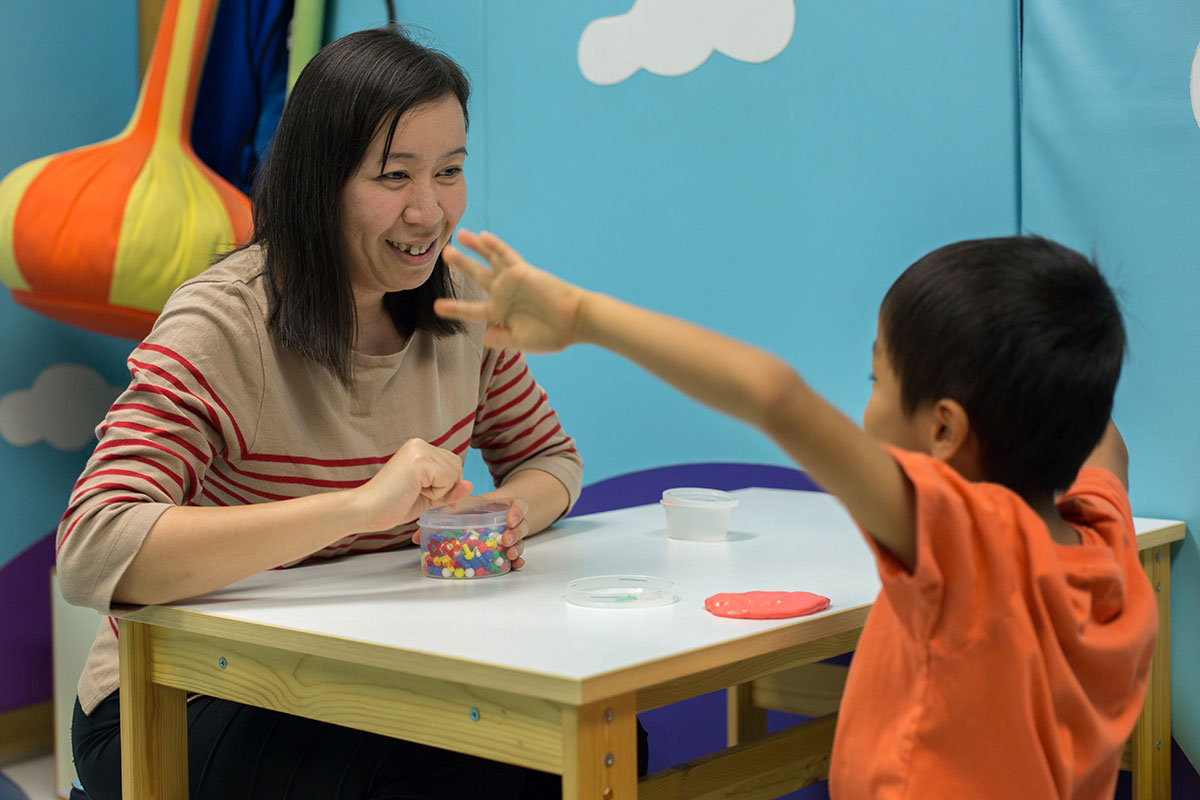 Upon touching a flour dough, the body receives sensory signals which will be organised and analysed by the brain to formulate the best response. Sensory integration dysfunction sneaks in when things go wrong in this process.
Upon touching a flour dough, the body receives sensory signals which will be organised and analysed by the brain to formulate the best response. Sensory integration dysfunction sneaks in when things go wrong in this process.
Children who appear ordinary in their early childhood may also have problems in learning, peer relationships or daily problem-solving when they are confronted by new requests in primary school. Some of them are diagnosed with AD/HD, autism or dyslexia, but some who lack diagnosis may have invisible disabilities.
"They cannot sit still in class and often make writing mistakes, leading to poor results and being misunderstood as lazy. Distress by their class performance, they may even wonder, 'I have really made an effort, what exactly do you want from me?' Setbacks drive them back to their comfort zone and retreat to an unhealthy way to handle difficulties and criticism. Ideas like 'do nothing to make no mistakes' and 'no good deed goes unpunished' are detrimental to their development in long run."
One of the jobs of an occupational therapist, as Joanne Chow reveals, is to put adults into the shoes of children. Adults hence realise their misconception and recognise the fact that children may be carrying a much heavier burden than they can ever imagine.
Different sores must have different salves. For the case of pen-clutching, occupational therapist may invite the child to play with tactile objects (such as shaving cream, flour dough, and Play-Doh) to enhance sensory stimulation of the hand and break communication barrier to the brain. Repetitive copying and other conventional ways are usually not effective for those weak at writing and reading. To better consolidate a language system in the brain, they may require more sensory assistance, such as moulding Play-Doh into words or writing in the air.
Everyone holds a different key to reading – some prioritise the sense of touch, some need vibrant colours, some complement with actions. Occupational therapists engage children in multi-sensory word-breaking activities to help them find the right key and develop their capability for independent learning. The clock is clicking for establishing a sound foundation because the learning model of "learn to read" will soon be replaced with "read to learn" in senior primary levels.
Joanne Chow says, "The good news is that children often show significant progress once you find the key. Every child is a treasure."
Most parents seek help from occupational therapists because of learning problems, dysgraphia in particular, of their SEN children. Joanne Chow clarifies that improving writing abilities is only one of the many tasks of occupational therapy. "Different life roles in areas of self-care, productivity, and leisure require different abilities. By adopting a human-centred approach, occupational therapists conduct suitable assessments to understand the reasons behind problems and devise therapy activities accordingly.
Children who are referred to occupational therapy first undergo assessments of hand-eye coordination, attention, visual perception, and sensory integration. Children are trained to be more independent in occupational categories of self-care, productivity, and leisure – "self-care" includes the ability to use the toilet and eat without help; "productivity" refers to learning, writing, self-management, and other important tasks of a student; "leisure" revolves around games.
Joanne Chow hopes SEN parents to understand the vital importance of self-directed games to the mental development of sensory integration. The role of commander allows children to feast on curiosity and develop more complex and flexible actions to adapt to new challenges. As a powerhouse of happiness and positive energy, games are instrumental to the cultivation of self-efficacy, motivation, and emotional management.
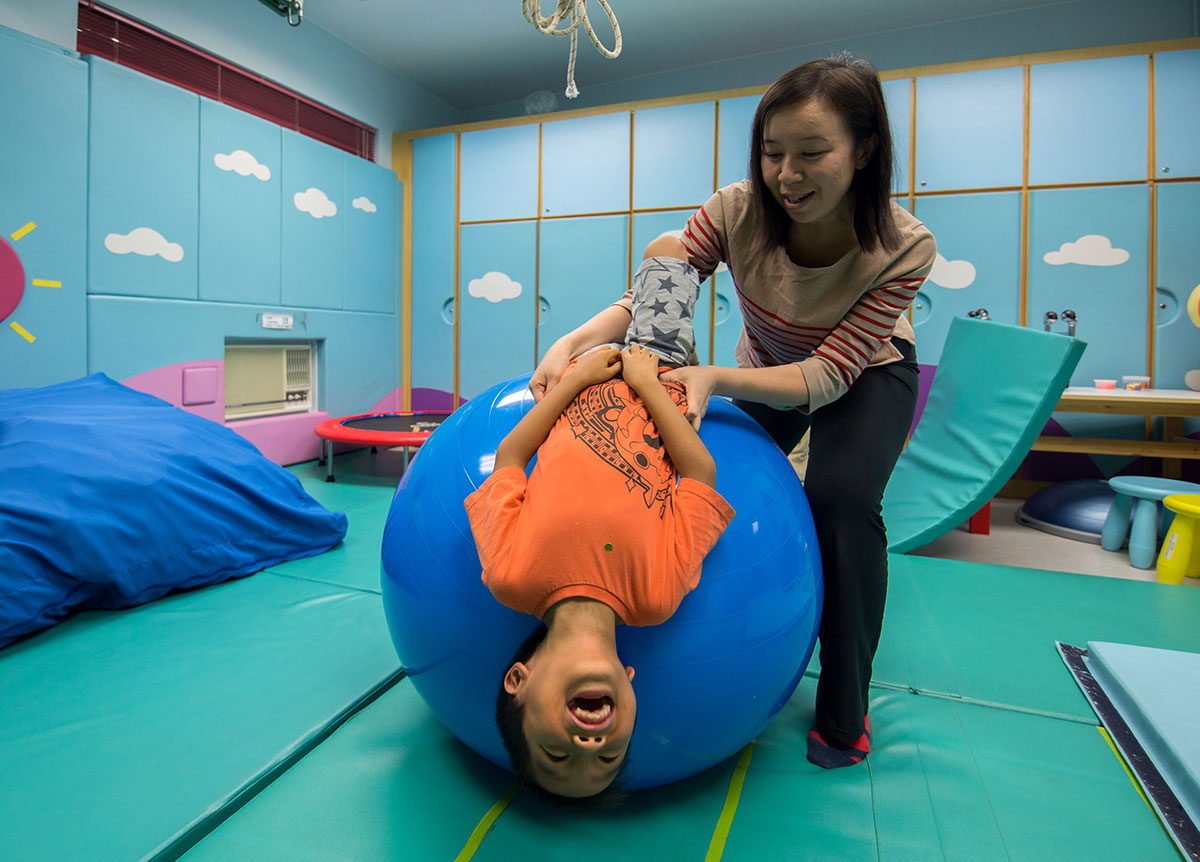 SEN children need playtime to input more sensory signals.
SEN children need playtime to input more sensory signals.
"Many parents reckon that children should sacrifice playtime for revision and writing once admitted to primary school. Such drastic change requires children and their rapidly growing brains to put a lot of efforts into adaptation. In fact, good sensory integration lays a sound foundation for logical thinking, organisation and planning management, attention, and self-regulation. The first eight years of human life is the critical period for brain development. Once missed, delayed development of basic functions is likely to get half the result with twice the effort."
On the other hand, Joanne Chow is also fully aware of the difficulties of balancing learning and training with gaming, especially with the jam-packed schedule of a SEN child. With the aim to tailor the best therapy suggestions, occupational therapists are keen on developing models of communication based on mutual respect with parents, teachers, and children so that all parties can freely express themselves.

June, 2017
We all have special needs – I with lactose intolerance can have no milk in their coffee; you with mysophobia find a dusty office unbearable; people suffering from severe hay fever find fragrances repellent…... Better understanding springs more tolerance which leads our way to a happier and fairer inclusive society.
April, 2016
Some parents compare the diagnosis of SEN for their children to being thrusted a bomb unprepared – no one can explain why or tell them how to go on. They can only hold onto the bomb with surreal calmness and keep waiting…
December, 2016
"Mum, dad, have you noticed that your kid is slightly different from other children…"We have complied different kinds of social resources for your reference, including those provided or subvented by the government, non-subvented self-financing ones, as well as mutual/self-help efforts.
Details